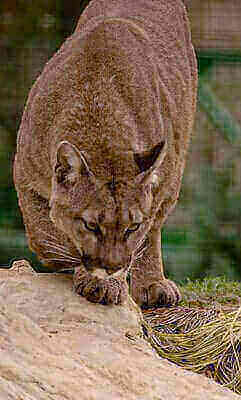Disclosure: We may earn commissions if you purchase products after clicking on a link from our site.
Are you interested in hunting cougars? Would you like to learn how to hunt cougars? Cougars are not easy to hunt. They are smart and elusive, and their nocturnal habits and stealthy ability make it very challenging to hunt them. In this article, we discuss how to hunt cougars to help you be more successful in hunting this big game animal.
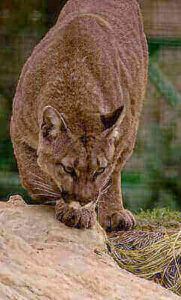
Table of Contents
How To Hunt Cougars
1. Scouting Cougars
Scouting cougars, also known as mountain lions, involves careful observation of their habitat and behavior patterns to increase the likelihood of a successful hunt. Cougars are elusive and solitary predators, making them challenging to track and locate.
Scouting begins with identifying cougar signs, such as tracks, scat, scratch marks on trees, and cached prey. Understanding the terrain features preferred by cougars, such as rugged terrain with ample cover and access to prey, can help hunters narrow down potential hunting areas.
Using trail cameras strategically placed along game trails or near water sources can provide valuable insights into cougar activity patterns, including movement corridors and preferred hunting grounds.
Additionally, scouting often involves studying local prey populations, as cougars follow their primary food sources. By carefully scouting and gathering intelligence about cougar behavior and habitat use, hunters can increase their chances of encountering these elusive predators in the wild.
2. Trail Cameras
Trail cameras are invaluable tools for hunters seeking to gather information about cougar activity in a given area. These motion-activated cameras can capture images or videos of cougars and other wildlife passing by, providing valuable insights into their behavior, movement patterns, and preferred hunting grounds.
When using trail cameras to hunt cougars, hunters should strategically place them along game trails, near water sources, or at other locations where cougar signs, such as tracks or scat, have been observed. By analyzing the images and videos captured by trail cameras, hunters can gain a better understanding of cougar activity patterns, including their daily routines, preferred travel routes, and potential hunting hotspots.
This information can then be used to plan hunting strategies and increase the likelihood of a successful cougar hunt. We reviewed the best trail cameras on the market today you can read from this link.
3. Predator Calls
Using predator calls can be an effective strategy when hunting cougars, also known as mountain lions. Cougars are opportunistic hunters and are known to respond to the distress calls of prey animals, such as deer or rabbits, which they perceive as potential meals.
By mimicking these distress calls using predator calls, hunters can lure cougars out of hiding and into shooting range. However, it’s essential to exercise caution when using predator calls for cougar hunting, as cougars are intelligent and cautious predators.
Hunters should be prepared for a quick and stealthy approach, as cougars may quickly assess the situation before deciding to investigate further or retreat. Additionally, hunters must ensure that they are familiar with local regulations regarding the use of predator calls and hunting cougars to avoid any legal issues. When making cat calls, call long and hard for about 45 minutes or more. You can read a review of the best predator calls from this link.
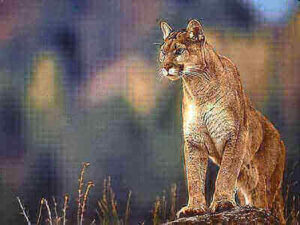
4. Set Up A Moving Decoy
Setting up a moving decoy can be a strategic method when hunting cougars, also known as mountain lions. Cougars are solitary predators and are attracted to movement, making a moving decoy an enticing target.
Hunters can utilize a decoy that simulates the movements of prey animals, such as deer or elk, to pique the curiosity of cougars and draw them into shooting range. Placing the decoy in an open area with good visibility allows hunters to maintain a clear line of sight and increases the chances of spotting approaching cougars.
However, hunters must exercise caution and remain vigilant while using a moving decoy, as cougars are stealthy predators known for their ambush tactics. Additionally, hunters should adhere to local regulations regarding the use of decoys and hunting cougars to ensure ethical and legal hunting practices.
5. Scent Control
Scent control is paramount when hunting cougars, as these elusive predators possess keen olfactory senses that allow them to detect even the slightest human scent. Cougars rely heavily on their sense of smell to locate prey and avoid potential threats, making them extremely sensitive to foreign odors in their environment.
Hunters must take meticulous precautions to minimize their scent and remain undetected while pursuing cougars. This includes washing hunting clothes with scent-free detergents, using scent-neutralizing sprays or cover scents, and storing gear in airtight containers to prevent contamination.
Additionally, hunters should avoid wearing perfumes or scented lotions and refrain from smoking or cooking strong-smelling foods before heading into the field. By practicing rigorous scent control measures, hunters can enhance their chances of successfully ambushing a cougar without alerting the elusive predator to their presence.
6. Be Quiet
Being quiet is essential when hunting cougars, as these elusive predators have exceptionally keen hearing and can detect even the faintest sounds in their surroundings. Hunters must move silently through the terrain, avoiding unnecessary noise that could startle or alert the cougar to their presence.
This means walking softly, avoiding stepping on dry leaves or branches, and minimizing the use of noisy gear such as rattling equipment or clanging metal. Additionally, hunters should refrain from talking loudly or making sudden movements that could draw attention.
By maintaining stealth and conducting themselves with utmost quietness, hunters increase their chances of getting close to a cougar without alerting it, thus improving their opportunities for a successful hunt.
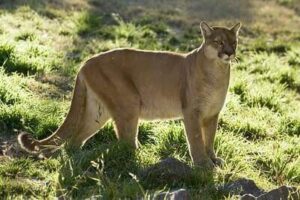
7. Hound Hunting
Hunting cougars with dogs is a traditional and effective method that harnesses the keen senses and tracking abilities of specially trained hounds. These hunting dogs often breeds like hounds or curs, use their acute sense of smell to pick up the scent trail of cougars, allowing hunters to follow their lead.
Once a cougar’s scent is detected, the dogs eagerly pursue the trail, barking and signaling to the hunters that they are on the chase. This method not only helps track down cougars in their natural habitat but also provides a level of safety for hunters, as the dogs can alert them to the presence of the cougar and help prevent surprise encounters.
Additionally, hunting with dogs can turn what might otherwise be a challenging solo pursuit into a collaborative and exciting experience between hunters and their trusted canine companions.
8. Weapons For Hunting Cougars
When hunting cougars, hunters often opt for firearms suitable for long-range shooting, such as rifles chambered in calibers like .270 Winchester, .30-06 Springfield, or .308 Winchester. These rifles offer sufficient power and accuracy to take down cougars effectively from a distance, which is crucial given the cougar’s elusive nature and tendency to avoid close encounters.
Additionally, some hunters may choose firearms with larger calibers for added stopping power, such as .300 Winchester Magnum or .338 Lapua Magnum, especially when hunting in areas where other large predators may be present.
Shotguns loaded with slugs or high-velocity cartridges can also be effective for close-range encounters in dense vegetation or brushy terrain. Ultimately, the choice of weapon depends on factors such as the hunter’s preference, the hunting environment, and local regulations.
9. Hiring An Outfitter
Hiring an outfitter can be a wise choice when planning a cougar hunt, especially for those unfamiliar with the terrain or hunting techniques specific to these elusive predators. Outfitters often possess invaluable local knowledge about cougar behavior, movement patterns, and prime hunting locations. They can guide on setting up effective bait stations or using predator calls to attract cougars.
Additionally, outfitters may offer access to private land with abundant cougar populations, increasing the likelihood of a successful hunt. Furthermore, outfitters typically provide essential equipment, such as specialized hunting dogs trained to track and tree cougars, as well as transportation and accommodations, ensuring a comfortable and productive hunting experience. Overall, hiring an outfitter can significantly enhance the chances of a safe, successful, and memorable cougar hunt.
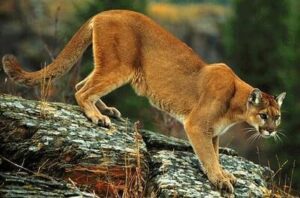
11. Hunting Partner
Hunting cougar, also known as mountain lion, can be a challenging and potentially dangerous endeavor, making it crucial to prioritize safety at all times. Hunting with a partner or a group significantly enhances safety by providing additional support and assistance in case of emergencies.
Cougars are apex predators known for their stealth and ambush tactics, and encountering one in the wild can pose serious risks. Having multiple hunters increases awareness and reduces the likelihood of surprises, as each member can watch different angles and scan the surrounding terrain for signs of cougar activity.
Moreover, hunting in a group allows for better coordination during tracking and pursuit, ensuring that any encountered cougars can be safely managed and controlled. Additionally, in the event of an encounter with a wounded or aggressive cougar, having backup from fellow hunters greatly improves the chances of effectively handling the situation and minimizing risks to everyone involved.
Overall, hunting with a partner or a group is essential for safety and enhances the overall experience of pursuing these elusive predators.
12. Hunting Optics
Optics play a vital role in cougar hunting, where visibility and accuracy are paramount in tracking and spotting these elusive predators. Hunters typically rely on high-quality binoculars and spotting scopes to scan vast and rugged terrain, allowing them to identify potential cougar movements and locations from a distance.
Binoculars with high magnification and clear lenses enable hunters to survey the landscape with precision while spotting scopes offer even greater magnification for detailed observations of distant objects. Optics with superior light transmission are particularly beneficial in low-light conditions, such as dawn and dusk, when cougars are most active.
Additionally, hunters often prefer lightweight and durable optics that can withstand rugged terrain and weather conditions commonly encountered during cougar hunts. With the aid of advanced optics, hunters can enhance their ability to spot, track, and ultimately pursue cougars with confidence and precision, maximizing their chances of a successful hunt while ensuring safety and efficiency in the field. If you are interested in optics, we reviewed the best hunting binoculars and the best spotting scopes on the market today.
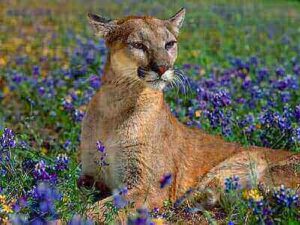
Cougar Hunting Tips
1. Always get the correct hunting license for hunting cougars.
2. Spotting and stalking are not one of the most effective ways of hunting cougars.
3. Hunting cougars with hounds is the most popular way of hunting cougars.
4. It is against the law to kill kittens or female cougars in the company of one or more kittens.
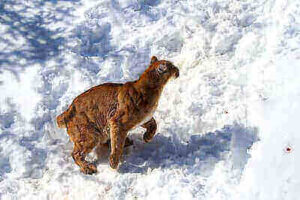
5. You must be present and an active partaker when using hounds to hunt cougars.
6. Handheld calls are allowed but electronic calls and devices are illegal.
7. It is required by law that you know how to identify the sex of the cougar.
8. You can use predators and moving decoys to lure cougars.
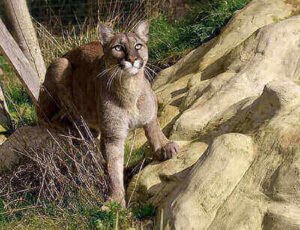
9. Consider hiring an outfitter if you are new to cougar hunting.
10. Always hunt cougars with a hunting partner.
11. When choosing an outfitter, be very careful as there are many outfitter scams.
12. Know the rules and regulations for hunting cougars in your state.
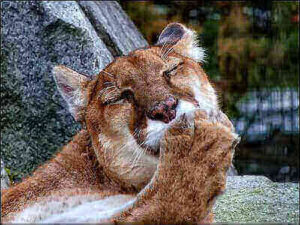
13. Don’t use weapons within 50 feet of country roads, municipal roads, or the centerline of state highways.
14. Scout the area for cougars before you go hunting. Look for tracks, scat, kill sites, and scrapes.
15. You can set up trail cameras to collect information on cougar movements and other behaviors.
16. Cougars have a very good sense of smell. Take precautions to eliminate your scent before you go cougar hunting.
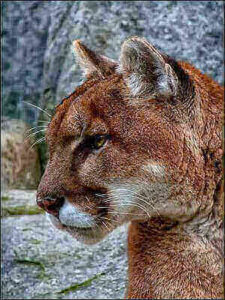
17. Be downwind of the area you want to hunt for cougars. You don’t want the cougars to pick up your scent from the winds.
18. Approach the hunting area slowly and quietly. Avoid talking, slamming car doors, and making noise while walking.
19. You will need quality optics like binoculars or spotting scopes to spot cougars.
20. It is mandatory in most states to check in the animal with the state wildlife agency.
21. Be aware of all of the information the state requires when you check in the animal.
22. Know all of the rules and regulations for checking in the animal with the state wildlife agency.
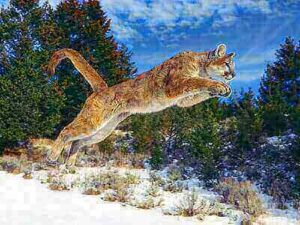
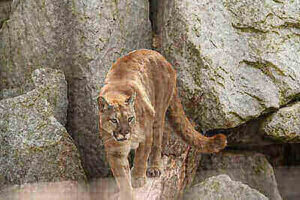
The Bottom Line
Cougars are elusive and very difficult to hunt. They blend well with the landscape, are smart, and know when they are being pursued. One of the most effective ways to hunt cougars is by using hounds. In this article, we discuss how to hunt cougars to help you become a more successful cougar hunter.
If you want to learn how to hunt bobcats, you can read this article. You can also read how to hunt wolves, how to hunt red fox, and how to hunt fox.
